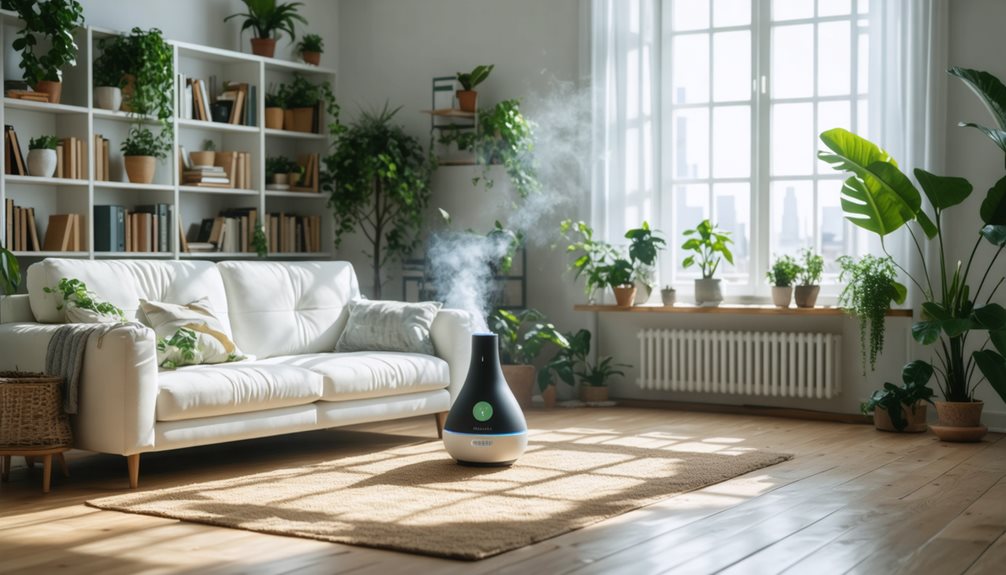A clean home delivers substantial health benefits beyond basic hygiene. Regular cleaning with HEPA-filtered vacuums and proper sanitization reduces exposure to allergens, dust, and harmful pathogens that can compromise respiratory health and trigger illnesses. Organized, clutter-free spaces lower cortisol levels, boost mental clarity, and improve sleep quality by creating a more relaxing environment. Physical safety also improves, as tidy spaces prevent fall-related injuries that affect over 500,000 people annually. Scientific evidence shows that maintaining a clean home environment provides multiple layers of protection for both physical and psychological well-being. Understanding these connections reveals even more powerful motivations for consistent home maintenance.
Key Takeaways
- Regular cleaning with HEPA-filtered vacuums removes allergens and harmful particles, significantly improving respiratory health and breathing conditions.
- Consistent disinfection of frequently touched surfaces reduces exposure to pathogens and lowers the risk of illness transmission.
- Organized, clutter-free spaces decrease cortisol levels and enhance mental clarity, leading to better focus and decision-making abilities.
- Clean bedrooms and regularly washed bedding promote better sleep quality by eliminating dust mites and other sleep-disturbing allergens.
- Well-maintained homes prevent accidents and injuries by reducing trip hazards and identifying potential safety risks before they cause harm.
Breathing Easier With Clean Air
Maintaining a clean home goes hand in hand with breathing healthier air. Regular cleaning practices significantly impact indoor air quality by reducing common allergens that can compromise respiratory health. Through consistent removal of dust mites, pet dander, and other airborne particles, occupants experience notable health advantages, including easier breathing and improved sleep.
The implementation of HEPA-filtered vacuum cleaners proves particularly effective in capturing harmful particles that would otherwise circulate through living spaces. This technical approach to routine cleaning guarantees thorough removal of microscopic contaminants that can trigger allergic reactions or respiratory distress. When combined with systematic cleaning of carpets, upholstery, and window treatments, these practices create an environment that supports ideal breathing conditions.
For improved results, incorporating air purifiers alongside regular cleaning routines provides an additional layer of protection against airborne allergens. This comprehensive approach to maintaining indoor air quality demonstrates measurable benefits for occupants, particularly those with existing respiratory sensitivities. By establishing and following consistent cleaning protocols, homeowners can significantly reduce their exposure to harmful particles while creating a healthier living environment that promotes respiratory wellness.
Fighting Germs and Staying Healthy
In terms of preventing illness in the home, regular disinfection of high-touch surfaces serves as a vital defense against harmful pathogens. Scientific evidence demonstrates that germs and bacteria can survive on doorknobs, countertops, and other frequently touched areas for extended periods, making cleaning and disinfecting essential for maintaining family health.
A clean kitchen plays a significant role in preventing foodborne illnesses, as proper sanitization interrupts the cycle of bacterial growth and cross-contamination during meal preparation. Regular cleaning of these spaces significantly reduces the risk of infections and helps Prevent the Spread of disease-causing organisms throughout the home. This is particularly important during cold and flu season when respiratory infections are more prevalent.
The hidden health benefits of maintaining a clean home extend beyond immediate disease prevention. Studies indicate that consistent sanitization practices can positively impact those with Allergies and Asthma, while also helping to reduce stress associated with living in an unclean environment. By implementing systematic cleaning routines, especially in high-risk areas like bathrooms and food preparation spaces, households can create a protective barrier against illness-causing pathogens, ultimately safeguarding the health of all residents.
Mental Clarity Through Organization
Order and simplicity in one’s living space serve as powerful catalysts for mental clarity and cognitive performance. Scientific research consistently demonstrates that a clean home environment directly influences our psychological well-being and ability to focus. Studies reveal that individuals who maintain organized spaces experience lower cortisol levels, resulting in reduced stress and improved mental acuity.
The relationship between cleanliness and cognitive function is particularly evident in how clutter affects decision-making abilities. When surrounded by organization rather than chaos, individuals demonstrate improved concentration and productivity. A systematic approach to maintaining a clean home creates an environment conducive to mental clarity and emotional stability.
- Experience the calming sensation of walking into a clutter-free bedroom after a long day
- Feel the immediate stress relief when working at a clean, organized desk
- Appreciate the sense of control and accomplishment that comes with maintaining an orderly living space
Creating and maintaining an organized environment isn’t merely about aesthetics; it’s a fundamental component of mental health and cognitive function. By prioritizing cleanliness and organization, individuals can cultivate spaces that promote focus, reduce anxiety, and support overall psychological well-being.

Sleep Quality and Rest
A pristine bedroom environment plays an essential role in achieving restorative sleep and maximizing rest quality. Research demonstrates that maintaining a clean home, particularly the bedroom, directly influences our ability to achieve deep, uninterrupted sleep cycles. By reducing dust and allergens through regular cleaning, individuals can minimize respiratory irritations and skin sensitivities that often disrupt restful sleep.
The significance of a tidy and organized sleeping space extends beyond aesthetic appeal. A clutter-free environment helps decrease stress levels and creates ideal conditions for the mind to transition into a state of relaxation. Regular maintenance of bedding through consistent washing eliminates dust mites and other potential sleep disruptors, while improved indoor air quality supports healthier breathing patterns throughout the night.
Studies consistently show that sleep quality improves significantly in clean bedrooms, as the reduction of environmental irritants allows for more restorative sleep cycles. By prioritizing cleaning helps create an atmosphere conducive to rest, individuals can experience fewer sleep disturbances and wake feeling more refreshed. This evidence-based connection between a clean bedroom and improved sleep emphasizes the importance of maintaining a clean home for optimal health and well-being.
Physical Safety at Home
Physical safety represents a significant aspect of maintaining a clean and organized home environment. Statistics reveal that cluttered homes contribute to over 500,000 fall-related injuries annually, underscoring the essential importance of maintaining order in living spaces. A clean and organized home significantly reduces trip hazards, particularly benefiting vulnerable household members like children and seniors.
Regular maintenance and cleanliness play important roles in preventing accidents and health issues. By keeping spaces tidy, homeowners can readily identify and address potential dangers such as loose cords or unstable furniture. Additionally, a consistent cleaning routine prevents the accumulation of harmful substances that may trigger respiratory problems or other health complications.
- Your family deserves a safe haven where they can move freely without fear of injury
- Every organized space represents a conscious choice to protect your loved ones’ well-being
- A tidy home environment creates peace of mind, knowing you’ve minimized accident risks
Beyond physical safety, maintaining an organized living space contributes significantly to mental well-being. The sense of security derived from a hazard-free environment reduces anxiety and creates a more comfortable living atmosphere for all household members.
Frequently Asked Questions
Does a Clean House Make You Healthier?
Yes, maintaining a clean house directly contributes to better health outcomes. Regular cleaning reduces exposure to allergens, harmful bacteria, and respiratory irritants, leading to fewer allergy symptoms and infections. Scientific evidence shows that clean environments improve indoor air quality, supporting better lung health. Additionally, organized, clean spaces promote mental well-being by reducing stress levels and enhancing sleep quality. These combined benefits significantly impact overall physical and psychological health.
Why Does a Clean House Make Me Feel Better?
A clean house improves well-being through multiple scientifically-validated mechanisms. It reduces stress hormones by creating an organized environment, augments mental clarity by minimizing visual distractions, and promotes better respiratory health by eliminating allergens and irritants. The physical activity of cleaning releases endorphins, while accomplishing cleaning tasks provides a sense of achievement. Additionally, improved sleep quality results from reduced allergens and a more peaceful atmosphere.
Why Is It Important to Have a Clean House?
Just as a well-maintained garden flourishes while a neglected one attracts pests and disease, a clean house is essential for both physical and mental well-being. A clean home reduces exposure to harmful allergens and pathogens, preventing respiratory issues and infections. Regular cleaning eliminates dust mites, mold, and bacteria, while also promoting mental clarity and reducing stress levels. Additionally, an organized living space encourages physical activity and supports better sleep quality.
Does a Clean Home Help Mental Health?
Yes, a clean home significantly benefits mental health through multiple evidence-based mechanisms. Research demonstrates that organized living spaces reduce stress, anxiety, and depression while promoting emotional stability. Maintaining a tidy environment increases feelings of control and accomplishment, enhancing psychological well-being. Studies show that individuals in clean homes experience improved focus, productivity, and overall life satisfaction compared to those in cluttered spaces. Regular cleaning routines contribute to mental clarity and emotional balance.





